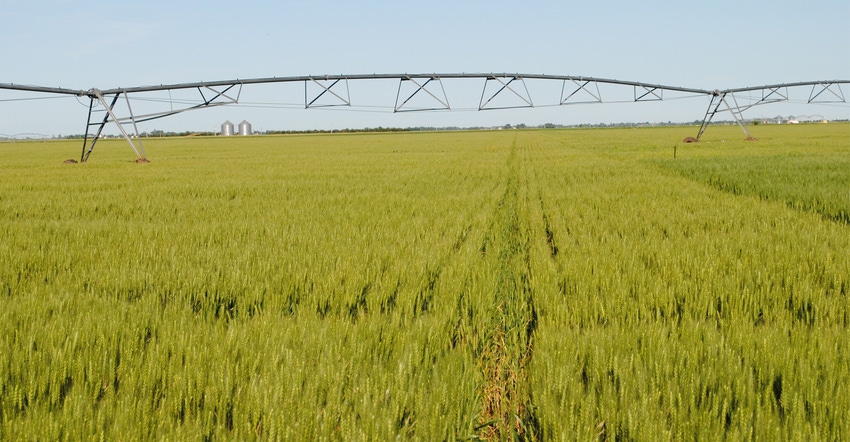
Managing water may be one of the biggest challenges on the horizon for not only farmers, but also everyone else. It's all about local communities when it comes to water. That's what Richael Young, Mammoth Trading co-founder and president, says. Founded three years ago in Lincoln and now headquartered in Denver, Mammoth led the development and implementation of the world's first active smart water market, transforming economic theory into practice and helping farmers grow while meeting conservation needs.
"Markets monetize water rights and create new incentives to conserve," Young says. "Producers are increasingly efficient with limited water resources, and we hope we can develop tools to help."
Mammoth operates groundwater markets in the Twin Platte and South Platte Natural Resources Districts in Nebraska and surface water markets in Washington. A native of California, Young has a bachelor’s in engineering and studied ag economics in graduate school at the University of Illinois. While at Illinois, she spent most of her research studying western Nebraska in the Republican and Platte river basins.
Understanding water resources in the state led her team to develop the smart market model. "Every analysis we did told us that NRDs would be able to achieve regulatory goals by using trading and markets," Young says. "And when we looked at how many producers were actually taking part in water markets, we found that participation was very low. We started asking farmers why that was."
Centralized hub
Some of the practical obstacles were identifying producers in their area that they were eligible to trade with, and trying to understand rules and regulations governing local water resources. "Water rights transfers can be quite complicated, so we wanted to create a system that would save producers time and money," Young explains. "We developed a centralized hub to pool many buyers and sellers, and an algorithm that automates matching between them. The market considers every rule of the local NRD to guarantee regulatory compliance," she says. "We also built a price discovery mechanism that was secure and fair. It has streamlined the process and reduced a lot of headaches for everyone."
Such a system is called a "smart market." The pooling, automation and confidentiality are advantages over bilateral negotiations or bulletin boards, Young says. While bulletin boards require manual review of the regulatory data and matching, it is automated with smart markets. "All water markets are local in nature because the resource is local," Young says. "Hydrology and the community needs, as well as the regulations, vary considerably. Because of all of those differences, every smart water market is tailored to the local area," she explains. "We want to use our resources efficiently, but also recognize the nuances between districts. Water management is never 'one size fits all.' And a smart market can handle that."
Trust critical for process to work
The ability to be anonymous in the trading and to keep water rights pricing confidential are other positive aspects of smart markets, Young says. "We won't disclose prices publicly, so our customers don't have to be afraid of their information getting into the wrong hands," she says. "To deliver for our customers and to work closely with the NRDs, trust is of the utmost importance."
When producers and landowners first contact Young, Mammoth Trading must verify NRD and court records to make sure the landowner actually owns the property and water rights to trade. NRDs govern how many irrigated acres, and in some districts, how much allocation, a landowner would have available to sell in a water market through the process of certification, Young says. "There are plenty of rules governing water transfers, but the most basic is that you are not allowed to sell more than you've historically used," she says. "Normally, a seller begins the process by contacting the NRD office to see how many irrigated acres they could market on a particular field, while a buyer would work with a pivot dealer or NRD to figure out how many irrigated acres they would need."
In the South Platte NRD, both temporary and permanent water rights transfers are allowed, but the Twin Platte NRD allows only permanent transfers. "Temporary transfers are normally for one growing season," Young says. "But I could imagine cases where a buyer and seller would arrange a multiyear lease." Mammoth plans to offer multiyear leases in the future, as well as other trading options that might provide more flexibility to producers, she says.
With permanent water rights transfers, the landowner is selling the water rights forever. "You are basically severing your water rights from your property," Young says. "If you own a piece of property with groundwater rights and you sell those rights, for a price, you are giving up the right to irrigate. So if you ever wanted to irrigate that land in the future, you would have to buy groundwater rights again," she explains. "Because permanent transfers can reduce the overall value of a property, they have to be cleared with any existing lienholders."
Typically, groundwater rights are sold off of poor soils and transferred to more productive land. "Irrigation is extremely valuable in western Nebraska, and it shows in the market," Young adds. If you want to learn more about smart markets, contact Young at [email protected].
About the Author(s)
You May Also Like






